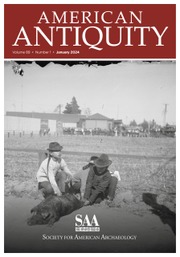Crossref Citations
This article has been cited by the following publications. This list is generated based on data provided by
Crossref.
Bullock, Peter Y.
1991.
A Reappraisal of Anasazi Cannibalism.
KIVA,
Vol. 57,
Issue. 1,
p.
5.
Milner, George R.
1995.
Regional Approaches to Mortuary Analysis.
p.
221.
Carr, Christopher
and
Komorowski, Jean-Christophe
1995.
Identifying the Mineralogy of Rock Temper in Ceramics Using X-Radiography.
American Antiquity,
Vol. 60,
Issue. 4,
p.
723.
Carr, Christopher
1995.
Mortuary practices: Their social, philosophical-religious, circumstantial, and physical determinants.
Journal of Archaeological Method and Theory,
Vol. 2,
Issue. 2,
p.
105.
Boyd, Donna C.
1996.
Skeletal correlates of human behavior in the americas.
Journal of Archaeological Method and Theory,
Vol. 3,
Issue. 3,
p.
189.
Dunnell, Robert C.
and
Greenlee, Diana M.
1999.
Late Woodland Period “Waste” Reduction in the Ohio River Valley.
Journal of Anthropological Archaeology,
Vol. 18,
Issue. 3,
p.
376.
Hurlbut, Sharon A.
2000.
The taphonomy of cannibalism: a review of anthropogenic bone modification in the American Southwest.
International Journal of Osteoarchaeology,
Vol. 10,
Issue. 1,
p.
4.
Knight, Vernon James
2004.
Characterizing Elite Midden Deposits at Moundville.
American Antiquity,
Vol. 69,
Issue. 2,
p.
304.
Andrushko, Valerie A.
Latham, Kate A.S.
Grady, Diane L.
Pastron, Allen G.
and
Walker, Phillip L.
2005.
Bioarchaeological evidence for trophy-taking in prehistoric central California.
American Journal of Physical Anthropology,
Vol. 127,
Issue. 4,
p.
375.
Armit, Ian
and
Ginn, Victoria
2007.
Beyond the Grave: Human Remains from Domestic Contexts in Iron Age Atlantic Scotland.
Proceedings of the Prehistoric Society,
Vol. 73,
Issue. ,
p.
113.
ROSS-STALLINGS, NANCY A.
2007.
The Taking and Displaying of Human Body Parts as Trophies by Amerindians.
p.
339.
SEEMAN, MARK F.
2007.
The Taking and Displaying of Human Body Parts as Trophies by Amerindians.
p.
167.
Carr, Christopher
Goldstein, Beau J.
and
Case, D. Troy
2008.
The Scioto Hopewell and Their Neighbors.
p.
523.
Verano, John W.
2008.
The Handbook of South American Archaeology.
p.
1047.
Carr, Christopher
2008.
The Scioto Hopewell and Their Neighbors.
p.
289.
Tung, Tiffiny A.
and
Knudson, Kelly J.
2008.
Social Identities and Geographical Origins of Wari Trophy Heads from Conchopata, Peru.
Current Anthropology,
Vol. 49,
Issue. 5,
p.
915.
Finucane, Brian Clifton
2008.
Trophy heads from Nawinpukio, Perú: Physical and chemical analysis of Huarpa‐era modified human remains.
American Journal of Physical Anthropology,
Vol. 135,
Issue. 1,
p.
75.
Carr, Christopher
2008.
The Scioto Hopewell and Their Neighbors.
p.
603.
Carr, Christopher
2008.
The Scioto Hopewell and Their Neighbors.
p.
151.
MacDonald, Douglas H.
Manzano, Bruce
Lothrop, Jonathan C.
Cremeens, David L.
Parker, Kathryn C.
and
Shreckengost, Brent
2009.
With Mica We Mourn: Fort Ancient Mortuary Practices at Clark Rockshelter, Kentucky.
Midcontinental Journal of Archaeology,
Vol. 34,
Issue. 2,
p.
249.


